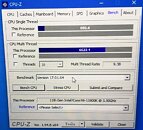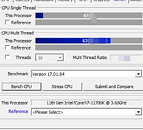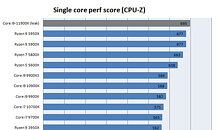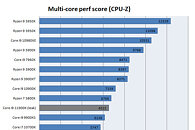Thursday, December 31st 2020

Intel Core i9-11900K CPU-Z Benchmark Score Leaks
Intel is preparing to launch their latest generation Rocket Lake-S processors in the coming weeks. We recently saw some leaked Geekbench 5 scores for the eight-core Intel Core i7-11700K showing it beating the AMD Ryzen 9 5950X in single-core performance. We have recently received some new benchmarks for the i9-11900K and i7-11700K this time in CPU-Z showing them once again best AMD in single-core performance.
The Cypress Cove core design found in these upcoming processors is expected to bring double-digit IPC gains over Skylake and this is reflected in these scores. Take all these benchmarks with a healthy dose of skepticism as we have no way of confirming these numbers until we can test the chips ourselves. The Intel Core i9-11900K gets a single thread score of 695.4 and a multi-thread score of 6522.1 which puts it 19% ahead of the i9-10900K and 3% ahead of the AMD Ryzen 9 5950X in single-threaded performance. The processor still falls far behind the Ryzen 9 5950X in multi-threaded performance due to it having half the number of cores.The Intel Core i7-11700K CPU-Z benchmark results were also leaked however the photo has been edited to hide the exact score. The i7-11700K scores 67X in single-threaded performance, and 63XX in multi-threaded performance. This puts it 18% ahead of the i7-10700K and close to or slightly below the Ryzen 9 5950X in single-core performance.
Sources:
@9550pro, @OneRaichu, VideoCardz, guru3D
The Cypress Cove core design found in these upcoming processors is expected to bring double-digit IPC gains over Skylake and this is reflected in these scores. Take all these benchmarks with a healthy dose of skepticism as we have no way of confirming these numbers until we can test the chips ourselves. The Intel Core i9-11900K gets a single thread score of 695.4 and a multi-thread score of 6522.1 which puts it 19% ahead of the i9-10900K and 3% ahead of the AMD Ryzen 9 5950X in single-threaded performance. The processor still falls far behind the Ryzen 9 5950X in multi-threaded performance due to it having half the number of cores.The Intel Core i7-11700K CPU-Z benchmark results were also leaked however the photo has been edited to hide the exact score. The i7-11700K scores 67X in single-threaded performance, and 63XX in multi-threaded performance. This puts it 18% ahead of the i7-10700K and close to or slightly below the Ryzen 9 5950X in single-core performance.




184 Comments on Intel Core i9-11900K CPU-Z Benchmark Score Leaks
As for the slight improvement in single core, even if the number is in the high single digit %, I feel RKL is not going to turn the tide for Intel. People who favor Intel will likely still go for RKL, but it is unlikely to entice many potential Ryzen buyers. For me, the higher power consumption and the need for some high end cooling for the higher tier chips is a turnoff for example. I feel the success of RKL will hinge heavily on its price and this is where Intel is always unwilling to budge until recently.
Prior to Zen 3, Comet Lake was by far the best gaming chip. The review sites that constantly said 'go ahead and get AMD' for a gaming system 'because it doesn't make any difference' were dead wrong.
What's sad is most of them won't do CPU scaling tests, you have to look elsewhere. TPU did one a while back, 3900XT vs 9900K / 10900K with a 2080 Ti. Here's the 1080P results. This is a 10 - 12% difference in FPS average.
It is very easy to see here that the Intel chips are GPU limited. The Zen 2 is getting very much CPU limited with a 2080 Ti. This didn't matter 6 months ago when very few had such a GPU, but as we go into 2021 and these new 3070s become more available this is what people who bought Zen 2 have to look forward to - this or buy a Zen 3 :
Edit: I should point out, that;'s an 3900XT, which is a percent or two faster than a 3900X.
The difference at 1440P was 8%, so no it is not showing up at just low res.
So lets now fast forward to today's GPUs.
First of all, a 3070 is faster than a 2080 Ti. So if you get a 3070 and pair it with Zen 2, you're down 10% or so vs say a 9900K or 10700K just like the TPU review. Even with a 3060 Ti, which is roughly the same as a 2080 Super, you're going to lose notable FPS.
So all those thousands of AMD posters who said "It's only 1 or 2% fps you won't notice it" - yeah those guys? They are only right if you stick with a GPU from 2019.
At the more extreme end, what happens if you get a 3090 and pair that with a Zen 2? Well about the only place we see that is on Zen 3 reviews, but it's pretty clear. Zen 2 fell farther behind, a lot farther. I'm going to focus on the 10700K because it was always less than the 3900X. Some examples :
10700K 15.2% higher fps vs 3900X :
10700K 15.6% higher fps vs 3900X :
Notice that lowly 10400 besting the 3900X above?
You can check the reviews yourself but the trend is prettty clear. The Intel Coffee / Comet Lake chips had a pretty solid 15% more headroom than Zen 2 as far as games went, and that's the 10700K vs 3900X. It's more if we're talking the 10900K. And these, without overclocking.
So, for games, Zen 2 has always been a horrific choice. People should keep this in mind when reading reviews, these review sites got it very wrong when recommending Zen 2 to gamers.
The second thing is that you're comparing pricing from a long time ago, Zen 3900X vs 10900K.
This is the reality of today. And the 10900K / 10700K / 10850K will smoke the 3900XT in games. Anyone building a gaming rig has to be either some kind of stupid, or have really drunk deeply of the AMD kool-aid to pick 3900X :
Not to mention that the 10850K doesn't seem to suffer from thermal/power issues as much as the 10900K does. If I had to choose between the two, I'd take the 10850K without a blink of an eye.Agreed. I'd much rather sacrifice a few % in performance and keep my temps under control.
Edit: Not to mention stability. What good is a 5+ GHz boost if you can only maintain it for half a minute?
Locked frame rate is from game engine itself, not from hardware limitations. Input lag is different story, it mainly because of monitor (input class divided between classes), and again not because of CPU hogging you down :rolleyes:That's my whole point.
If you game at 1080p 60hz, would it be wise to invest more than $200 CPU? Let alone recommended it. Once resolution up and demand for higher refresh rate kick in, that your GPU start working.Sadly, those price to performance king is now lost, AMD is for rich people and Intel for the poor :D
Cheapest i3 10100 can be had for $125, while Ryzen 3 3100 is now blatantly $185, almost twice initial price. AMD year old APU doesn't fare better, 3200G chugging $195. If this trend continues, Intel doesn't have to compete AMD in performance or core count, just release mediocre CPU at reasonable price :p
At no point would I have tried to claim Zen2 is faster for gaming because there's no reasonable evidence anywhere to suggest that. When I said:I don't know how I can put it more clearly. That's literally three consecutive statements that Zen2 wasn't as good as Intel 10th Gen for gaming directly from me.
My point was that Zen was fast enough that in most scenarios it didn't matter. If you want to run twitch shooters at low res and 200+fps then 5GHz Intel was always the best option but I'd also avoid calling Zen2 a "horrific choice" as you did. In 2019 and most of 2020, a AMD CPU that provides 90% of the gaming performance for 90% of the price and much lower power consumption, was far from horrific. Right now, everything's irrelevant as supply of Zen2 stopped ages ago and Zen3 is almost unobtainable due to popularity and scalping. We'll have to wait several months for supply and demand to balance out and bring any semblance of order.
For now, 10th Gen Intel is still in stock. If you have to buy now, at possibly the worst possible time in the last two decades, then I guess that's what you're buying because that's all that's left anwhere close to MSRP. Intel are struggling with supply just as hard as AMD right now, but with Zen2 selling much higher volumes in the DIY channel throughout the last 18 months and Zen3 demand being stratospheric, you won't find either of them at sensible prices. The 10th Gen Intel didn't sell well at pre-Zen3/Ampere/RDNA2 launch, so inventory sat on shelves and filled warehouse - to our benefit right now because compared to scalper prices on AMD right now it's definitely the better choice.
The gamer that bought say a 10700K is still fine with these new GPUS, they are not much CPU limited on GPUs like the 3060 Ti, or even a 3070 or 3080. Zen 2 users will lose around 8% FPS with a 3060 Ti, and up to 15%+ on higher end GPUs.
I wouldn't consider that kind of loss due to CPU selection "fast enough". That was my whole point.
Now today, if it were widely available, Zen 3 would be the obvious choice (noting that it isn't widely available). It clearly has at least a little headroom on GPUs, so will probably be ok for theoretical Nvidia 4XXX series in a couple of years. Comet Lake seems tapped out on current high end GPUs like the 3080 and 3090, but is at least still in the running vs Zen 3 and even bests Zen 3 on about 1/3 of games.
Zen 2 - bottom of the chart now. When 4XXX series release, Zen 2 will likely drop off the chart just like Zen 1 and 1+ have.
Edit: I recommend this video in the topic. First hand experience: I used a Ryzen 3 3100 with my RX 5700 XT while I was waiting for my 5950X to arrive. The Witcher 3 ran at 120 FPS. Now it runs at 140 FPS. Apart from the occasional frame dips with the 3100, I would never tell the difference.
And in answer to your question, hell to the freaking yes losing an entire tier or in some cases more than a tier of GPU performance due to bad CPU selection matters.
Gaming is GPU-limited and has been for a whole decade. When it isn't GPU-limited, Zen 2 is worse for gaming than 9th Gen and 10th Gen. We know already. Everyone does. There are thousands of reviews, comparisons, benchmarks, articles, proving as much over the course of the last 18 months. You're just adding noise to the thread.
Edit:
C'mon man, even though this is an argument that you can't win because everyone already agrees with the side you're taking, who's gonna buy a 3080 to run old games at 1080p medium? That's a 9 game average going back to 2013 titles ffs.
If, in the future, a game comes along that is so CPU dependent that Zen2 owners are losing loads of performance even at settings and resolutions appropriate to their GPU - then they'll probably just accept that they didn't buy "the gaming CPU" and move on. It's pretty unlikely that will happen because it hasn't happened for the last 9 generations of CPU but hey, I'm not ruling it out....
With this in mind, the only item in this chart that warrants an upgrade is the i7-4770K (although a 141 FPS average still isn't too bad). Tossing a 3900X in the bin just to buy a 10900K is pure madness in my opinion.If a magically unoptimized game comes along that runs at 10 FPS on a 3900X, then it'll run at 12 FPS on a 10900K, because there's a huge 20% gap between them. That's the dividing line between unplayable and ... unplayable.
I doubt the supply issues are going to stabilize anytime soon (I hope I'm wrong). But even so -- when the supply does stabilize 5xxx series will be the best but expensive; so Intel's lava lakes will still be in that middle ground (esp with a modest OC) between zen 2 and zen 3 in terms of performance. Gaming wise there's very little difference between zen 3 and intel below 400fps and productivity-wise the 10850 stacks up nicely to the 5800x and the 10700k to the 5600x.
The 5900x will be the flagship, but anyone who doesn't want to drop $550 on a CPU can be in the market for either 5800x/10850/5600x/10700 without any wrong choices there.
You don't need an expensive AIO unless you're going to OC and / or unlock power limits.
So if we add in all the negative cost factors of getting a Z490, getting an AIO, add in the benefit - in that scenario the OC / Power unlocked 10700K actually ties it up with the 3900X in productivity :
Or you could just get a B460 and a 10700 non-K with an AIO, power unlock it, and be within 8% on productivity apps and a decisive win in gaming.
Or you could go purely stock with a stock cooler and win at gaming.
But if you go and get all those things you're talking about as being needed then I have to assume you're going to be power unlocking and potentially overclocking since all that extra expense is there.
In that scenario the best Zen 2 can muster is equal performance for lower power. Most of the time it's going to lose - even in productivity.
But if you're talking stock vs stock, then sure Zen 2 wins in productivity.
But if that is the comparison, there's no need whatsoever for a Z490 nor an AIO.
Right now it doesn't seem that AMD really has a chip between $550-$210 that's available / worth buying over the competition -- the 3600/XT rose in price along with other zen 2 parts to where it's same as a 10600K - (which the 10600K is a much better chip) -- the 3700x is sitting at $325-$350, which is the same price as a 10700 (a generally better overall chip which doesn't need a z490) -- it's really not until you get down to the 3600 non-x at $210 where AMD is very viable again - but that also faces some competition from the 10-series.
I don't think this changes much until the 5600, 5700x or 5900 (non-x, if that is even a thing), release and are available to buy in quantity (which they will sell out like hotcakes for the first few months even at $650 for the 5900 and $500 for the 5700x).
That's a good thing that's long overdue, given how long desktop has been stuck with the old Skylake architecture, but you also have to remember that a new process probably isn't going to reach the clock speeds of 14nm+++ and it's such a mature, refined process that to reach the clocks and yields of 14+++ would probably take a good couple of years after the first successful desktop products on a new node.
The other thing to remember is that Intel's 14nm+++ really isn't that far behind TSMC's 7nm:
Intel's 10nm doesn't work because it's way too ambitious for current fab technology and trying to do far too much at once. Estimates put Intel's 10nm as similar gate density to TSMC's planned 5nm process. It's far denser than the 7nm and 8nm processes at TSMC and Samsung.
10nm was too ambitious for several years but today, when competitors are already there Intel is lagging behind. 10nm was designed to be slightly denser than TSMC's 7nm. Intel supposedly game back a good bit of that density for one reason and another to get working chips out. TSMC's 5nm is clearly ahead, Samsung's 5nm is closer and more competitive today than Intel's comparable 7nm, which we have heard almost nothing about.
screenrant.com/marvels-avengers-96-percent-player-count-loss/Sure that's all well and good, and as @Chrispy_ mentioned, I don't think anybody is arguing against Intel 10th gen beating out Zen 2 in gaming when it comes to raw numbers. But let's take a step back for a second - aside from a professional esports gamer that wants the absolute maximum framerate at 1080p, I would argue that anybody in their right mind that's ponying up $1100+ for a 2080Ti and another $400+ for a 3900X/10900K is playing on 1440p at minimum.Reviewers recommended AMD for gaming systems because they were more versatile chips and offered consumers more value for their money. I recall many of them specifying that Intel was still the way to go for a strictly gaming build if you wanted, no, needed to chase that maximum framerate dragon. But for the budget-minded consumer, AMD offered very compelling chips - yes, they did perform slightly worse in games, but they traded that for generally better productivity performance, as well as overclocking all throughout the product stack that wasn't locked behind a higher-end chipset or K-series CPU.
Samsung's 5nm is reportedly 127MT/mm2.
Intel 10nm and TSMC 7nm are both around 100MT/mm2 (originally Intel was shooting for around 130MT/mm2).
TSMC 5nm is 170ish MT/mm2
Intel's 7nm is estimated to be between 200 and 250 MT/mm2 - better than TSMC 5nm (we'll see).
Samsung 8nm, which Nvidia is using, is estimated around 60MT/mm2
TSMCs 12nm node is around 28MT/mm2
GloFlo 12nm node is around 37 MT/mm2
Intel's 14nm node is around 38 MT/mm2
Also what the density itself represents varies. Intel uses a flip flop and a logic gate. I'm pretty sure Samsung is talking about SRAM, and SRAM is smaller than logic gates.
If we just go by the stated density, Samsung's 5nm is expected to be just a little bit better than Intel 10nm / TSMC 7nm, usually the type of thing that would rank a "+" or some such.
And Samsung's 8nm is really a node improvement over their 10nm - which itself is rated around 51MT/mm2 or about half of Intel's 10nm.
This is one of the 'choose AMD' talking points that simply isn't true.
They knew what they were doing when they decided to start making those cards at this point in time.
To me the real sign of cinfidence in your choice you "know" to be superior is to not feel the need to defend it on every post that might challenge it.
Anyone who thought AMD taking the top performance crown would be anything but a momentary reversals hasn't been paying attention yes Intel is reaching the end of what this arch can provide but it STILL has provided uplifts everytime (something that kept them always in front of amd before).
It's great that amd actually came to compete this time but to be clear they caught up and did a typical "trading blows" type of win and knowing Intel had a planned upgrade to that existing part coming just several weeks later you'd have to very dim to not assume they "trade blows" the other way very quickly.
Hopefully what we see is both trading this title back and forth for the majority of the future leading to all of us consistently getting much better bang for our buck whenever we decide to upgrade. The fanboys really need to calm down they act like they WANT Intel to fail as of that is going to make AMD start giving out even more power for free or something... Lol
And as far as my self I'll always go with what provides the best performance around (but within the "reasonable" top tier stuff and bang for buck)
For years that's been Intel and with Intel chips typically holding their value much better in the second hand market I've stuck with them (sold 7700k last may for $300 meanwhile my buddy's 1800x from the same time in 2017 only sold for $175)
So I have Intel still and will likley sell this chip (10900k) for the new one if it really increases the gaming performance significantly (its all I really care about).
Next upgrade will be a mother fresh start and if the second hand resale market looks better I may switch sides but in 2017 I made the right choice going 7700k and I think for my upgrade in May 2020 the 10900k was still my best bet (waiting much longer would have seen my 7700k value drop very fast with 3300x dropping) and with Intel chips still holding their value incredibly well the upgrade to 11 series likely won't cost me much at all.
I'm happy to reccomened amd when it makes the most sense and it does for many but for me and my timing needs it didn't this past year.... Maybe next time.